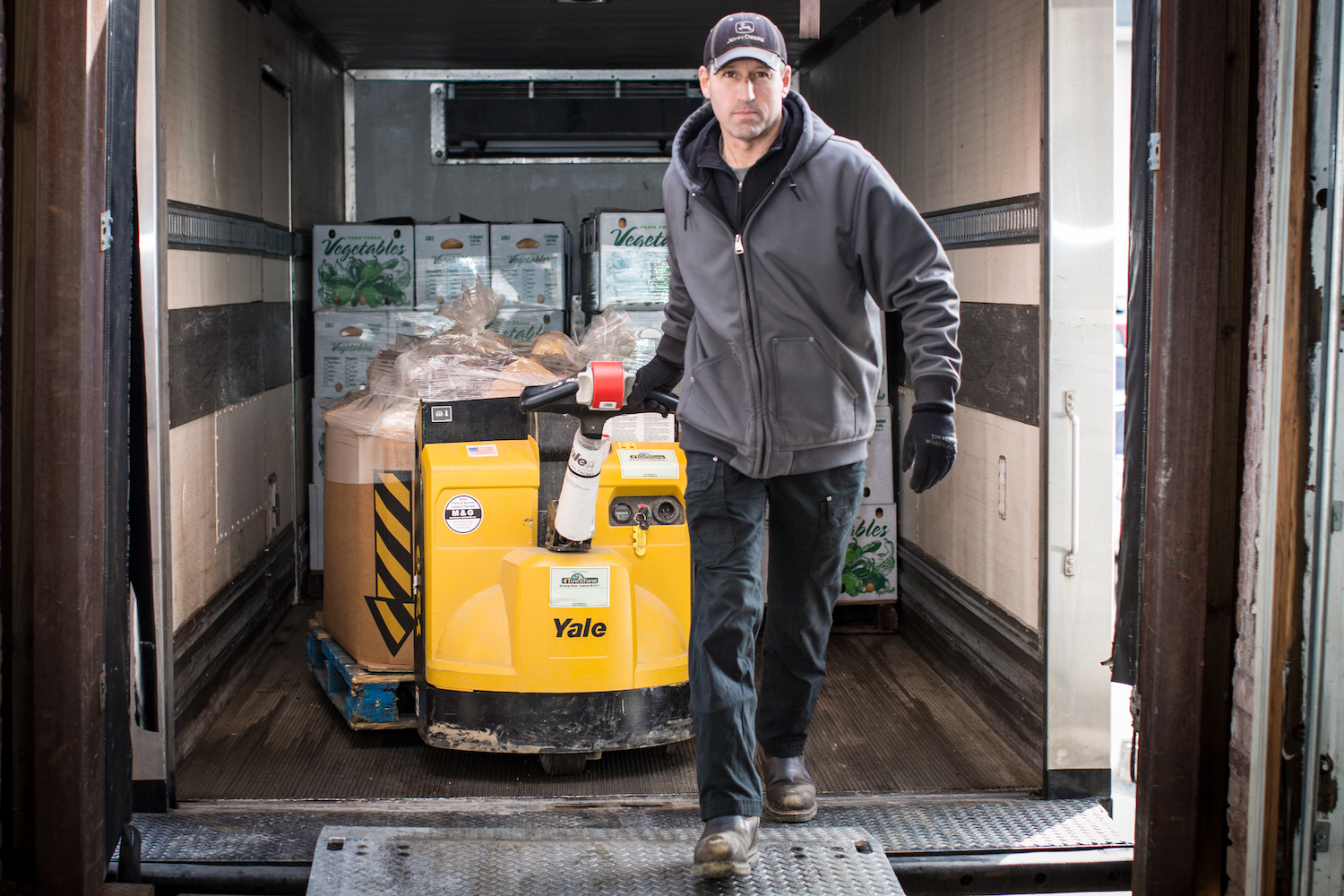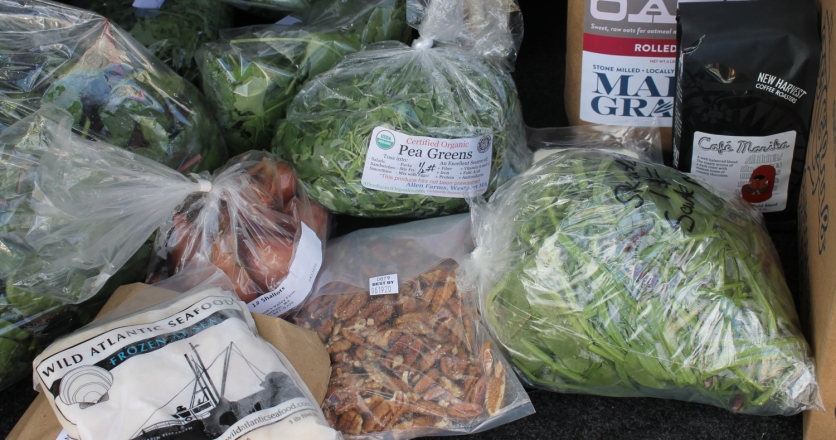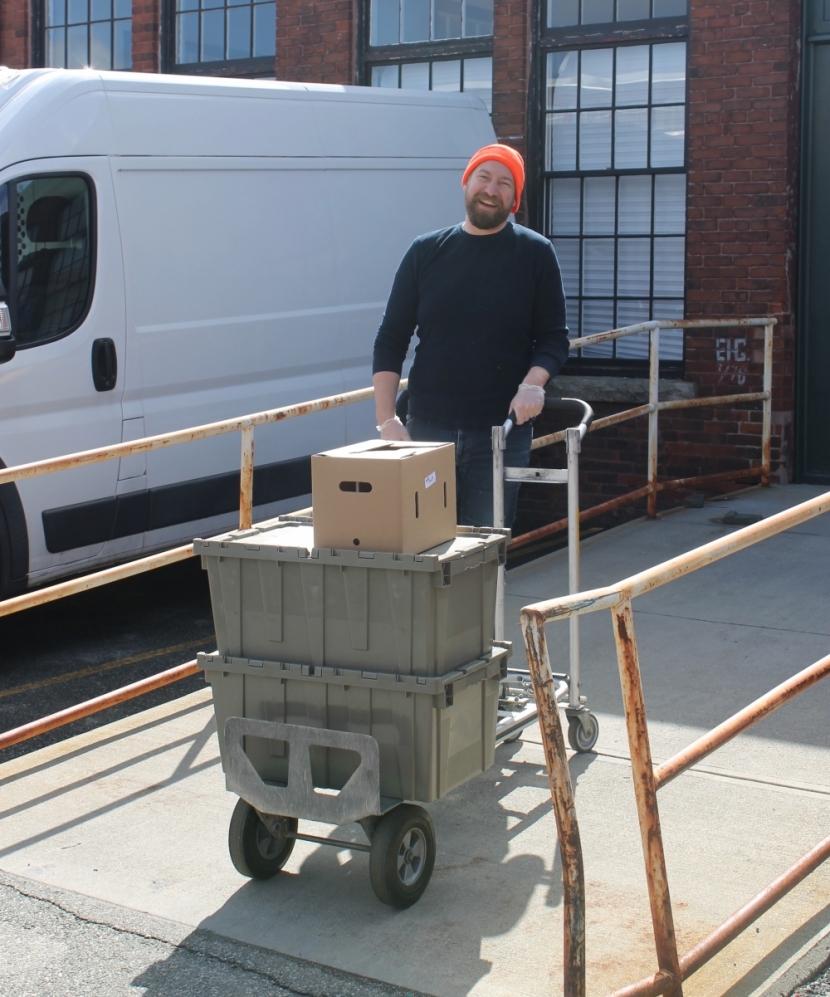Market Mobile Pivots to Residential Deliveries
Spaghetti squash. Parsnips, parsley and beets. Kale and radishes, spinach and sweet potatoes. This bounty of fresh food from local farms was available in March when COVID-19 shuttered their biggest customers—universities and restaurants served by Farm Fresh RI. Literally overnight, a prime source of revenue for local farms and food businesses vanished.
Previously delivering only to wholesale businesses through its Market Mobile service, Farm Fresh pivoted to serve residential customers for the first time. Inviting orders for pickup or home delivery, Farm Fresh made the quick switch to maintain an open avenue of sales for farmers and makers that otherwise would be mostly gone, says Rebecca Seggel of Farm Fresh. That swift thinking caused seasonal sales to triple compared to last year.
“We saw an immediate need from the farming community to find outlets for the food being grown that now would not be purchased in large quantities by chefs and food service buyers throughout our region—as well as a desire from the community to have a safe way to purchase local food,” Seggel says. “This [crisis] would have been a real blow to our local food system. Luckily, the response from the community has been overwhelmingly positive—and is helping these farms and local food businesses survive through this troubling time.”
The wildfire growth was immediate. In the first 24 hours, they had 525 new subscribers statewide, says Farm Fresh Market Mobile manager Nikki Ayres. Subscribers climbed into the thousands within days, so Farm Fresh had to limit deliveries in Providence, Pawtucket and East Bay because they couldn’t keep up with demand. Where previously they had averaged $25,000 in spring sales with 80 large stops along the delivery route, now they will deliver $60,000 worth of food in the next three days across 323 residential stops of $60+ orders. They nearly tripled their business within one week.
“We have done days like this in the summer. But this is way more,” Ayres says. “We typically have 75 to 100 farms participating. If we had no accounts ordering, family farms could potentially go out of business from this. And now they’re all being positively impacted as orders are larger than they normally would be. From an economic standpoint, this is huge. It needed to happen. We are hearing from so many people that there is no food in the grocery stores, while there is an abundance of food being grown here.”
With his seasonal farm stand closed, and farmers markets feeling that COVID-19 pinch too, Chris Clegg of Four Town Farm in Seekonk, Massachusetts, was worried. Since springtime is incredibly busy for local farms, clearing out winter stocks and preparing fields for the upcoming season, Clegg relied on those big customers for sustenance. Luckily, he says, “This is a brilliant adaptation to an unfortunate circumstance. [With this pivot] we had one of our biggest weeks since last fall. It was probably three times the dollar value of what we normally would sell this time of year.”
He says if this didn’t happen, “our sales would have significantly dropped off. So this allowed us to remain consistent,” Clegg says. “We are fortunate to have different outlets. Our stand and market is our primary source of income. For some farmers and producers, Market Mobile is a lifeline. We’re just adapting and improvising.”
Minnie Luong of Chi Kitchen in Pawtucket, which manufactures a variety of kimchi (fermented cabbage) products, says it remains difficult to pinpoint the exact impact of the closures. Though she is seeing a 45% increase in sales compared to this time last year, her food service channels have been decimated due to restaurant and institutional closures.
“We are selling to institutions and retail stores already, and we are getting huge demand for fermented products because of their health benefits. So when Farm Fresh announced the changes, we were immediately able to offer single jars instead of cases. Now individuals are ordering gallon quantities and sharing with neighbors,” Luong says. “Market Mobile home delivery is definitely making up for some food service losses.”
Luong says she also was planning to launch a new fermented sesame slaw later this year, but she fast-tracked it for Market Mobile’s residential delivery. She’s also promoting products differently now, and offering videos on social media to help new residential customers make her kimchi Bloody Mary recipe.
The response “has been overwhelming. We have tons of orders,” Luong says. “We are a small community, and people here want to expressly buy local foods for health and well-being. I was impressed that Farm Fresh had the ability to quickly adapt, and change their operations. I am there every week and what they’ve done is wonderful. I could see their leadership respond so quickly to be beneficial for the consumer.”
Farmer Adam Graffunder of Foggy Notion Farm says, “Before they promoted Market Mobile for home delivery I was afraid we might have to set up our own web store and do deliveries. Delivering products, web support and online promotion are not my favorite parts of being a farmer, so I think it’s great that we can pay Market Mobile to do all of these parts for us. I wrote a little piece of software so we can print out product labels instead of writing them out by hand, as we had been doing. That cost a few late nights and a day at home away from the farm.”
In the meantime, this is a high-stakes game and everyone is adapting to demand day by day. While farmers pack orders based on supply and purchase new packaging materials to accommodate smaller residential orders, the program continues to gain momentum and subscribers. Farm Fresh is analyzing how this new service might fit into its new 60,000-square-foot Food Hub facility in Providence, slated for completion later this year.
“The amount of support and patience has been amazing, along with the sense of community. People are getting orders together for their elderly neighbors. There is a silver lining about how people are being good to each other. And the farming community is working overtime to fill these orders,” Ayres says. “There are a lot of happy farmers, and this makes their hard work worth it. They still have an outlet for their food. That’s what really makes this go. Local food is getting to people that maybe never would have bought local, too. This could change the way we eat in general.”







